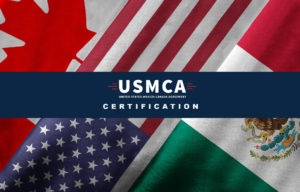News & Insights
USTR Submits the 2020 Trade Policy and Annual Report to Congress
On February 28, 2020, the U.S. Trade Representative (USTR) submitted President Trump’s 2020 Trade Policy Agenda and Annual Report to Congress. The 300-page report details how the Administration’s follow-through on promises made to change U.S. trade policy has resulted in an economic “blue-collar boom” with higher wages, more jobs and a stronger economy. The report also outlines the Administration’s key trade goals for 2020, including negotiating new trade agreements, enforcing trade agreements, and making changes to the World Trade Organization (WTO). In a Fact Sheet published on its website, the USTR provided the following highlights from the Report:
| Economic Successes: | · More than 500,000 manufacturing jobs have been added to the American economy since then since 2017. · Real median household income is at the highest level recorded, and wages are growing faster for nearly all groups—but, historically disadvantaged groups are seeing the fastest growth. · Wealth inequality has declined, as the share of net worth held by the bottom 50% of households has increased while the share held by the top o1% of households has decreased. |
| China: | · The U.S. confronted China over its unfair trade practices, and the Phase One Agreement that was signed requires major structural changes by China relating to intellectual property protection, technology transfer, agricultural standards, financial services, and currency, while maintaining leverage with significant tariffs on $370 billion worth of imports from China. · The Phase One Agreement also expands trade, with enforceable commitments by China to increase purchases of U.S. exports by $200 billion over the next two years in four major areas: manufactured goods, agriculture, energy, and services. Both sides expect that China’s increased imports of U.S. goods and services will continue on this trajectory beyond 2021. |
| U.S.-Mexico-Canada Agreement (USMCA) | The USMCA will replace the NAFTA, and will lead to fairer trade and robust economic growth in North America. The USMCA— · Fosters U.S. manufacturing by requiring high-wage labor content for autos; · Provide new market opportunities for the U.S. textile and apparel sector; · Provides strong protection and enforcement of intellectual property rights; · Includes strong labor provisions; · Expands market access for American food and agricultural products; · Contains strongest disciplines on digital trade; and, · Makes environmental obligations fully enforceable. |
| Japan | The U.S. negotiated 2 trade agreements with Japan: the US-Japan Trade Agreement and the US-Japan Digital Trade Agreement. As a result of these agreements, more than 90% of U.S. food and agricultural products imported into Japan will either be duty free or receive preferential tariff access, and new digital trade rules covering $40 billion in trade will help drive innovation and economic prosperity. |
| Enforcement of US Trade Laws and Agreements | The United States is actively enforcing trade laws and free trade agreements. Over the last year, the US initiated two actions to enforce environmental provisions in free trade agreements, and its trading partners changed their practices. The United States also obtained an historic WTO award of $7.5 billion annually – the largest in WTO history – in the long-running dispute with the European Union over illegal subsidies to Airbus. |
| World Trade Organization (WTO) | · The United States led efforts to assess the failings of the WTO Appellate Body and issued the first comprehensive study of the Appellate Body. The Report details the Appellate Body’s repeated failure to follow the rules WTO Members agreed to. It also describes how the Appellate Body’s persistent overreaching has taken away Members’ rights and imposed new obligations on those Members without their consent. · The United States led efforts to improve transparency and compliance with notification of certain trade-related obligations. The United States was the first WTO Member to table a transparency proposal that establishes appropriate consequences for chronic non-compliance with notification obligations. · The United States proposed updating Members’ special and differential designations so the WTO can reflect current economic realities. As a result, several WTO Members have renounced seeking special and differential treatment in trade negotiations going forward. · Together with other WTO Members, the United States is working on e-commerce and digital trade initiatives. The United States has proposed high-standard rules in all key areas of digital trade, such as those related to cross-border data flows, privacy, source code, and cybersecurity to help ensure that digital trade can continue to drive economic growth and development. · The United States is actively working to finalize a multilateral fisheries agreement. The United States is aiming high to achieve meaningful reductions in these harmful subsidies and imposing real constraints on the world’s largest subsidizers. |
| Expanding an “America First” Trade Agenda | · Over the coming year, the Trump Administration will focus on negotiating new trade agreements, strongly enforcing the nation’s trade laws, and protecting American interests at the WTO. · The United States will pursue balanced and reciprocal trade agreements with important strategic partners, including the United Kingdom, the European Union and Kenya. · United Kingdom – As part of a trade agreement with the UK, the United States aims to achieve a fairer and deeper trade relationship with the UK by addressing certain tariff and non-tariff barriers and agreeing on high-standard rules. · European Union – For many years, U.S. businesses have been at a disadvantage in doing business in the EU. In a fair trade agreement with the European Union, the United States seeks to eliminate EU barriers to its markets and seeks a more balanced trade relationship. · Kenya – In pursuing negotiations on a trade agreement with Kenya, the Trump Administration is responding to Congress’ mandate, as expressed in the African Growth and Opportunity Act, to negotiate reciprocal and mutually beneficial trade agreements that serve the interests of both the United States and the countries of sub-Saharan Africa. · The Trump Administration will continue to aggressively enforce U.S. trade laws to protect the interests of American businesses and workers. USTR will monitor US trading partners to ensure their compliance with the terms of bilateral, regional, and WTO trade agreements. Where appropriate, USTR may take action under Section 301 of the Trade Act of 1974 or recommend action under other statutory authorities granted to the President. · The United States will also explore a broader reset at the WTO. For example— · The WTO currently locks in an outdated tariff framework that no longer reflects deliberate policy choices and economic realities. Members need to fundamentally rethink tariff commitments by the United States and its trading partners. · In addition, the United States will continue to push for a close review of the WTO’s budget, which has faced little scrutiny in the past. The WTO must ensure that there is accountability and that expenditures reflect the priorities of its Members. · Finally, the United States will advocate for changes that allow for more — and more effective — plurilateral agreements. |
If you have any questions relating to the Section 301 Tariffs on China, the Phase One Agreement signed by the U.S. and China, U.S. free trade agreements or other international trade-related issues, please contact us.
News & Insights

Customs and Border Protection Begins Targeting Imported Goods Suspected of Being Made with North Korean Forced Labor
U.S. Customs and Border Protection (“CBP”) has recently begun scrutinizing import shipments suspected of being made with North Korean forced labor, as directed by the recently enacted Countering America’s Adversaries Through Sanctions Act (“CAATSA”). CAATSA gave expanded authority to CBP

Recent Federal Maritime Commission Activity
On April 27, 2020, the Federal Maritime Commission (FMC) issued a press release of immediate interest to the international transportation community granting temporary relief from certain service contract requirements. The FMC’s mission is to ensure a competitive and reliable international


